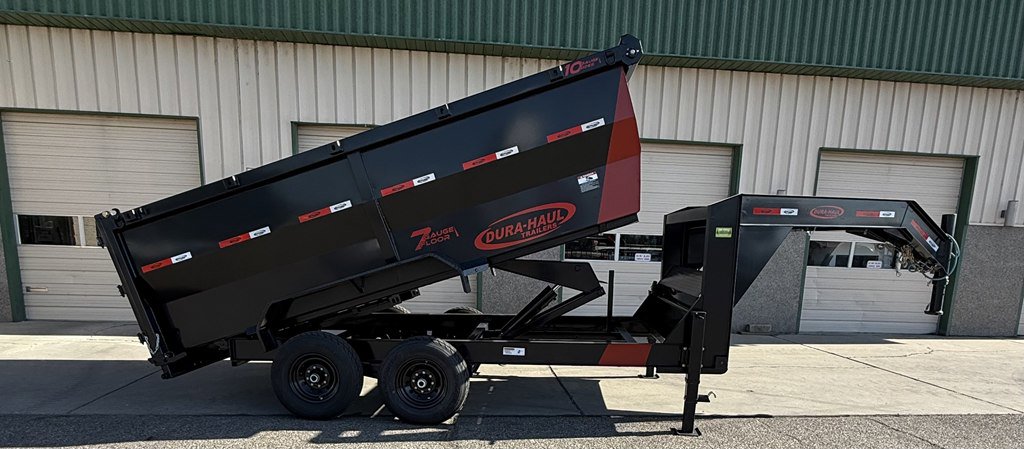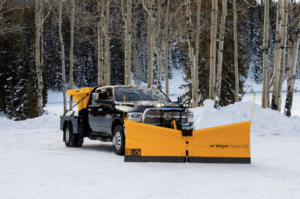When you are looking to purchase a dump trailer, finding the right fit for your intended use is critical. Here are some things that should be considered.
What size are you looking for? Dump trailers come in a variety of sizes and configurations. Everywhere between a 5’x8’ single axle bumper pulls up to a 102”x20’ tandem dual axle goosenecks.
What can your tow vehicle handle? It is important to consider the vehicles tow capacity and pair it properly with the dump trailer that corresponds. Is your tow vehicle gooseneck capable? Do you want to have a gooseneck hitch installed? If no, then you need to stay with a bumper pull.
What weight capacity do you need? Dump trailers come in a variety of capacities. Anywhere from a 5K rated single axle up to a 25K capacity tandem dually. Consider the heaviest type of material you will be hauling and what it may weigh per cubic yard.
What manufacturer should you choose? There are many different brands of dump trailers on the market. Not all dump trailers are constructed with the same quality of material or craftmanship. Dig into the details. A quality sales rep should be able point out the differences in the brands you are considering.
What dealership should you buy from? Many trailer dealers do not offer any type of after the sale service. Make sure you purchase from a local servicing dealer. This is important. If you do happen to have any warranty issues. The convenience of having an in town or nearby reputable dealer cannot be understated.
Dump Trailer Use Cases by Industry
Not all dump trailers are the same. The type of intended use is very important when purchasing a dump trailer. Are you a homeowner using the trailer for occasional light duty use or are you a contractor that is going to need a high-grade trailer that can handle commercial applications.
Homeowner Light Duty Use
Uses: Most homeowners need a dump trailer for occasional light duty use. Some of these uses are household trash hauling, light duty landscape materials, cleaning horse stalls, hauling firewood, etc.
Size and Weight Capacity: Typically, you are going to be looking for some of the smaller versions, perhaps something between a 5’x10’ 7K rated tandem axle bumper pull, and a 6’x12’ 10K rated tandem axle bumper pull. This trailer would give you a payload capacity somewhere in the range of 4-7,000 lbs. This range will usually cover the needs of most homeowners.
Tow Vehicle: Most modern half ton pickup trucks have a tow capacity around 10,000 lbs. It is important to know the tow capacity before purchasing. Make sure the dump trailer does not have a capacity greater than the tow vehicles rating. The dealership salesperson should be able to assist in the determination if needed.
Landscaping Commercial Use
Landscapers need a versatile, well-constructed, high quality dump trailer. Features are very important as well. Here are some very useful and readily available options that you will need to consider.
Scissor Style Hoist: Much more reliable and powerful than single straight hydraulic rams.
Spreader Rear Gate: A spreader style gate will give you the ability to either dump the entire load all at once or control the rate at which it dumps. Very convenient for efficiency and control.
Roll-Up Tarp Kit: Having a built-in tarp kit saves a considerable amount of time. With one man operation you can tarp a load in a matter of seconds. Some have solid covers that prevent wear and damage.
Slide-Out Ramps: With ramps you can use the trailer for multiple purposes. Not only can you haul and spread materials, but you will be able to haul crucial equipment to the job site.
Solar Battery Tender and Plug-in Wall Charger: When you hook up to get to work the last thing you need is problems. With a solar tender and a plug in wall charger you can ensure that your trailer is always fully charged and ready for a full day of use.
Side Extensions: Many manufacturers offer a variety of side options. Most standard sides are 24” tall with an option to add another 24” set of side extensions. These extensions could also be added to a trailer with taller standard sides. Keep in mind that taller sides do not increase payload capacity.
Heavy Duty Dump Trailers for Construction Sites
There are number of considerations to make when purchasing a dump trailer for commercial use.
Floor Thickness: This can make or break a dump trailer that is meant for daily commercial use. Whether hauling gravel, boulders, or old concrete. You want to make sure that you purchase a trailer with a 7-gauge floor. There are many dump trailers on the market with inferior 10-gauge flooring. They may have a lower initial expense but will cost you in the long run.
Scissor Style Hoist: Much more reliable and powerful than single straight hydraulic rams.
Axle Capacities: For commercial use axle capacities should be carefully considered. Although it seems that it is always better to be able to haul more than you need than it is to not be able to haul enough. You should also consider DOT regulations. For example. You may want a dump trailer that has two 8k rated axles under it. If your truck has a GVWR of over 10,000 lbs. and your trailer is rated at 16,000 lbs. you will have a gross weight of over 26,001 lbs. and will be required to have a Class A CDL in order to tow it. Empty weights, payload requirements and truck details are all important to discuss with your salesperson while deciding on the right axle capacities for your application.
Gooseneck or Bumper Pull: The age-old question. Gooseneck trailers no doubt seem to tow smoother. Bumper pull trailers tend to bounce at the pivot point. They also require additional equipment. You will need a gooseneck hitch the bed of your truck and potentially a light plug as well. Another consideration is capacities. If you take the same capacity trailers. One being a gooseneck and the other being a bumper pull you will be able to haul less in the gooseneck. This is simply because the gooseneck trailer weighs more than the bumper pull version. The axle capacities are the same but the gooseneck weighing more will decrease payload.
Servicing Dealer: With daily commercial use it is important to purchase from a reputable well-established dealer that has a great service department, and a large stock of parts. Whether it is a warranty issue or just something you need fixed from use and abuse, you are going to want them in your corner.

